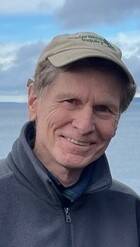We’d come to Shinglemill Creek on a weekday afternoon hoping to see spawning salmon. Our friends had just whispered where to look and left us alone in pale, leaf-filtered sunlight and silence.
As we spotted the male salmon, nearly two feet long, resting almost motionless under the near bank and out of the current, we found ourselves held in a long, timeless reverie. With a couple of gentle sweeps of his tail, he crossed five feet of open water to the fine gravel sloping gently from the other side. Once there, in a single fluid motion, the salmon rolled onto his side, quivered a second or two, and fertilized eggs previously deposited by a female.
He then abruptly turned and coasted back to his earlier still-water resting place. There he hovered for several more minutes, before returning to the gravel to repeat the sequence, over and over, as we watched wordlessly.
I thought of the miles he’d come across open ocean and the effort he’d expended at the end of his life swimming upstream through the fast-moving creek to this place of his birth. I tried to imagine his exhaustion, how the feeble, failing energy we were witnessing had been saved a lifetime for this final, primal act and gift to his species. In hours, his would be another tattered carcass downstream, decomposing as his sisters and brothers have for millennia.
A little later that afternoon, election day 2024, I imagined the mill, for which the creek had been named, where majestic cedar trees were split into shingles. That mill (now long gone) and the people who lived near it would for decades foul this creek and fill its drainage with debris. The spawning sites were ruined and made inaccessible to the salmon.
Eventually most humans forgot that the fish had once come here. Only recently, after generous volunteers cleared and revived the creek, have the salmon gradually begun to return to Shinglemill Creek.
Across the globe, humans’ insatiable hunger and wasteful behaviors have ruined habitat for countless forms of life. In this election, many Americans denied or seemed oblivious to the risks at stake. Our use of fossil fuels has already destabilized all of the earth’s major physical systems. As the planet convulses, experts like veteran journalist Bill McKibben say that with climate change inevitable, all humans can do now is try to stop it from intensifying to the point that it “cuts civilizations off at the knees.”
I’m reminded of a phrase in my church’s prayer book: “This fragile earth, our island home.” Will America continue to “Drill baby, drill,” thereby choosing to foul our home permanently? Or, might we belatedly decide to start cleaning up the messes we’ve created?
There by the creek, I couldn’t yet know how the election would go. In the waiting and worry, I wondered how long it would be before my own final swim upstream. I felt exposed and weak, with a daunting and relentless future rushing toward me.
In that vulnerable and uncertain moment, the old, lone salmon spoke to me.
Through his resilience, his determined sacrifice, and his raw instinct for the survival of his species, he offered medicine I desperately needed. He reminded me that life is so much more than its challenges. Futility and doom are never assured. That salmon reignited my imagination and a hope that, with our Creator’s help and the hard work of good people, we can go farther and do more than we think possible. Gifted with life on this beautiful planet, we have both a responsibility and capacity to sustain it.
For that, and for the salmon, I give thanks.
Tom Craighead is a retired Episcopal priest and hospice chaplain, and a Vashon resident.



